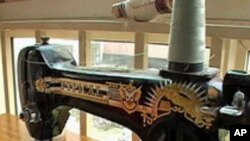When the Communists took over China in 1949, some of the most highly sought luxuries were a sewing machine, a wristwatch and a bicycle. Now, 60 years later, urban Chinese people have a very different wish list.
Beijing resident Jia Qiufang, 72, bought her sewing machine in the 1970s. It helped her save money on clothing for her four children.
In the early years of communist rule in China, a sewing machine was one of the so-called big items that indicated a high living standard.
These iconic household goods have changed over the years, from wristwatches, radios and bicycles, to refrigerators and televisions.
Jia says today all these items are commonplace.
She says now every home has a phone, TV, fridge and washing machine, but before the '80s these were much rarer.
Today, one of the big items on the Chinese consumer wish list is a car. Jia's son Qi Yongli, 50, just bought his third.
Qi says he thinks there are just two big items today - a house and a car.
Through the 1980s, it was mostly government departments or businesses that had cars. In 1992, there were about one million privately owned cars in China. Now there are about 41 million.
This year alone China is set to sell about 11 million cars, 20 times more than the number of cars sold a decade ago. At this rate, car sales in China are expected to overtake the United States for the first time this year.
Another big item today is a house. Beijing homes are expensive; an average family would need 27 times its yearly income to purchase a typical house.
Li Yu is 32 years old and married, with a four-year-old daughter. She is paying a mortgage on her Beijing house.
Li says owning a home is a lot of pressure because housing prices in Beijing are the highest in the country.
Yet Yang Shuai, manager of a Beijing real estate office, says home ownership is on the rise.
Yang says more people are buying houses than renting, because families need to be residents to send their kids to school.
Before housing reforms in 1985, only 17 percent of city homes were privately owned. Now estimates put urban home ownership at 80 percent or higher.
Consumers also want computers and cell phones, but in cities, these are no longer status symbols. Gao Wenjuan has been selling computers for five years. She says computers and cell phones are already very common household items.
Gao says in the cities, homes often have at least two computers.
With consumers increasingly able to purchase the big items, their aspirations turn to more intangible things. Li Gang, a Beijing resident in his 20s, says travel is becoming important.
He says having a visa to go abroad could count as a big item for today's Chinese consumers.
Working at her sewing machine, Jia says there is nothing left she wants to buy. Instead, the big item she wants is for future generations to get an education.
Jia says she had to work in the countryside as a young woman, but all three of her grandchildren went to college. She thinks that with each coming generation, her descendants' quality of life will continue to improve.






